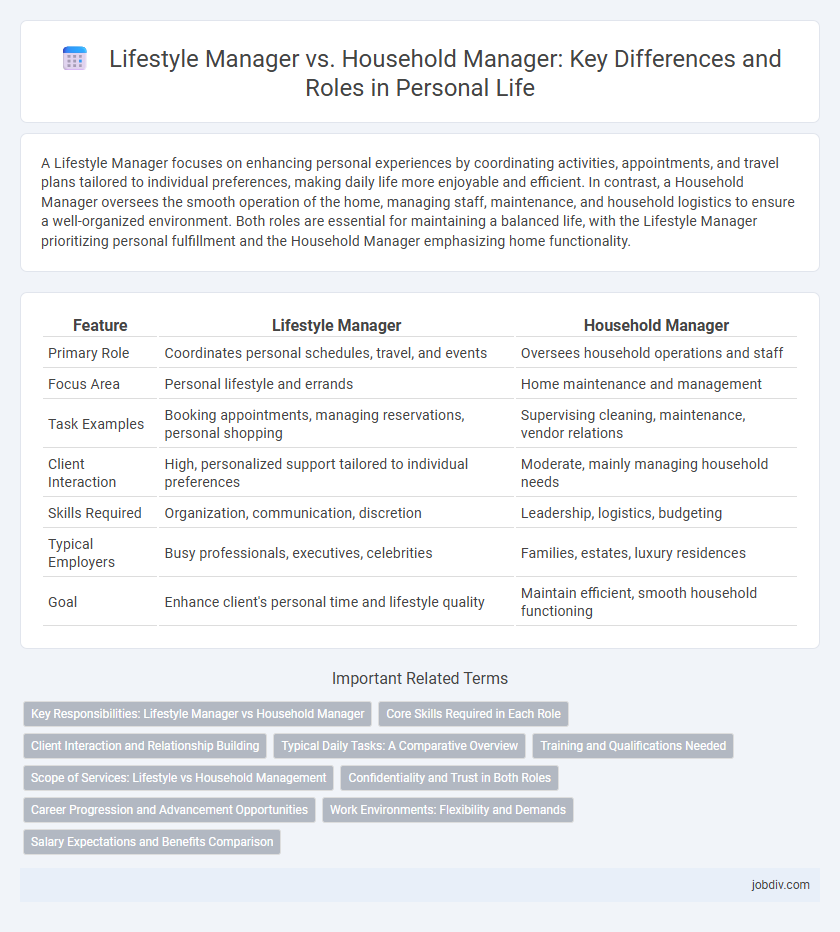A Lifestyle Manager focuses on enhancing personal experiences by coordinating activities, appointments, and travel plans tailored to individual preferences, making daily life more enjoyable and efficient. In contrast, a Household Manager oversees the smooth operation of the home, managing staff, maintenance, and household logistics to ensure a well-organized environment. Both roles are essential for maintaining a balanced life, with the Lifestyle Manager prioritizing personal fulfillment and the Household Manager emphasizing home functionality.
Table of Comparison
| Feature | Lifestyle Manager | Household Manager |
|---|---|---|
| Primary Role | Coordinates personal schedules, travel, and events | Oversees household operations and staff |
| Focus Area | Personal lifestyle and errands | Home maintenance and management |
| Task Examples | Booking appointments, managing reservations, personal shopping | Supervising cleaning, maintenance, vendor relations |
| Client Interaction | High, personalized support tailored to individual preferences | Moderate, mainly managing household needs |
| Skills Required | Organization, communication, discretion | Leadership, logistics, budgeting |
| Typical Employers | Busy professionals, executives, celebrities | Families, estates, luxury residences |
| Goal | Enhance client's personal time and lifestyle quality | Maintain efficient, smooth household functioning |
Key Responsibilities: Lifestyle Manager vs Household Manager
Lifestyle Managers coordinate clients' daily schedules, personal appointments, travel arrangements, and event planning to enhance overall work-life balance. Household Managers oversee home operations, including staff supervision, maintenance, budgeting, and supply management to ensure smooth household functioning. Effective Lifestyle Managers focus on time optimization and personal concierge services, while Household Managers emphasize domestic management and logistical support.
Core Skills Required in Each Role
Lifestyle managers excel in client relationship building, time management, and personal concierge services, ensuring seamless daily routines and tailored experiences. Household managers require expertise in staff supervision, property maintenance, and budgeting to maintain smooth household operations effectively. Both roles demand strong organizational skills, attention to detail, and adaptability to meet dynamic client needs.
Client Interaction and Relationship Building
Lifestyle Managers prioritize personalized client interaction, tailoring services to meet individual preferences and enhancing daily convenience. Household Managers focus on maintaining efficient home operations and staff coordination, ensuring seamless execution of domestic tasks. Strong relationship-building skills are essential for both roles to foster trust and long-term client satisfaction.
Typical Daily Tasks: A Comparative Overview
A Lifestyle Manager coordinates personal appointments, travel plans, and social engagements to streamline daily life, while a Household Manager oversees property maintenance, vendor coordination, and domestic staff management to ensure the home operates efficiently. Typical daily tasks for a Lifestyle Manager include scheduling, errand running, and event planning, whereas a Household Manager handles inventory control, repairs, and household budgeting. Both roles require organizational skills but differ in focus, with Lifestyle Managers emphasizing personal convenience and Household Managers prioritizing home functionality.
Training and Qualifications Needed
Lifestyle managers often require specialized training in areas such as time management, personal wellness, and concierge services, emphasizing skills that enhance clients' daily lives and personal goals. Household managers typically need formal qualifications in property management, budgeting, and staff supervision to efficiently oversee home operations and maintain a smooth-running household. Both roles benefit from certifications in communication, organization, and project management, but household managers usually possess more hands-on experience with domestic staff and maintenance protocols.
Scope of Services: Lifestyle vs Household Management
Lifestyle managers focus on improving personal and professional life balance by arranging travel, events, and wellness activities tailored to individual preferences. Household managers oversee daily domestic operations, including staff supervision, maintenance scheduling, and budget management, ensuring smooth household functionality. The scope of lifestyle management is broader and more personalized, while household management emphasizes efficient home administration.
Confidentiality and Trust in Both Roles
Lifestyle managers and household managers both handle sensitive personal information, requiring a high degree of confidentiality and trust. Lifestyle managers focus on managing clients' schedules, personal affairs, and vendor relationships while maintaining privacy, whereas household managers oversee daily home operations, staff coordination, and security with equal discretion. Trust is paramount in both roles to ensure seamless management and protection of private family and personal details.
Career Progression and Advancement Opportunities
Lifestyle Managers often advance by expanding their client base and specializing in luxury services, gaining certifications in personal concierge and event planning to boost career growth. Household Managers progress through demonstrating expertise in property maintenance, team supervision, and budgeting, often moving into estate management or senior executive roles within private residences. Both careers offer upward mobility, with Lifestyle Managers leaning toward client-centric roles and Household Managers toward operational leadership positions.
Work Environments: Flexibility and Demands
Lifestyle Managers often operate in dynamic, client-centered environments requiring adaptability to varied personal schedules and preferences, offering significant flexibility. Household Managers typically work within a fixed setting, such as private residences, focusing on routine maintenance and staff supervision, which demands consistent presence and structured hours. The flexibility of a Lifestyle Manager contrasts with the more stable but time-intensive nature of Household Manager roles, shaping distinct work-life balances.
Salary Expectations and Benefits Comparison
Lifestyle managers typically earn between $60,000 and $90,000 annually, reflecting their broad scope of personal and professional coordination tasks, while household managers' salaries range from $50,000 to $80,000, focused more on home operations and staff supervision. Benefits for lifestyle managers often include travel reimbursements, health insurance, and performance bonuses, whereas household managers may receive housing allowances, meal provisions, and paid time off. Salary expectations vary significantly by location and client budget, with lifestyle managers commanding higher pay due to their specialized skills in managing diverse personal and lifestyle needs.
Lifestyle Manager vs Household Manager Infographic

 jobdiv.com
jobdiv.com